International Legal and Ethical Issues in Business Report Analysis
VerifiedAdded on 2022/09/12
|7
|1484
|14
Report
AI Summary
This report examines international legal and ethical issues in business, focusing on two examples. The first example explores a pharmaceutical company's strategies to stymie generic competition, analyzing legal barriers to market entry and the ethical implications of such actions. The second example investigates the effects of mergers and monopolies on consumer advocacy, detailing the reasons for consumer concerns, pitfalls beyond pricing, and the ethical dilemmas involved. The report uses ethical theories, such as utilitarianism, to evaluate the actions of the companies. It covers legal and ethical aspects of business decisions, emphasizing the impact on competition, consumer welfare, and ethical business practices, with references to relevant literature.
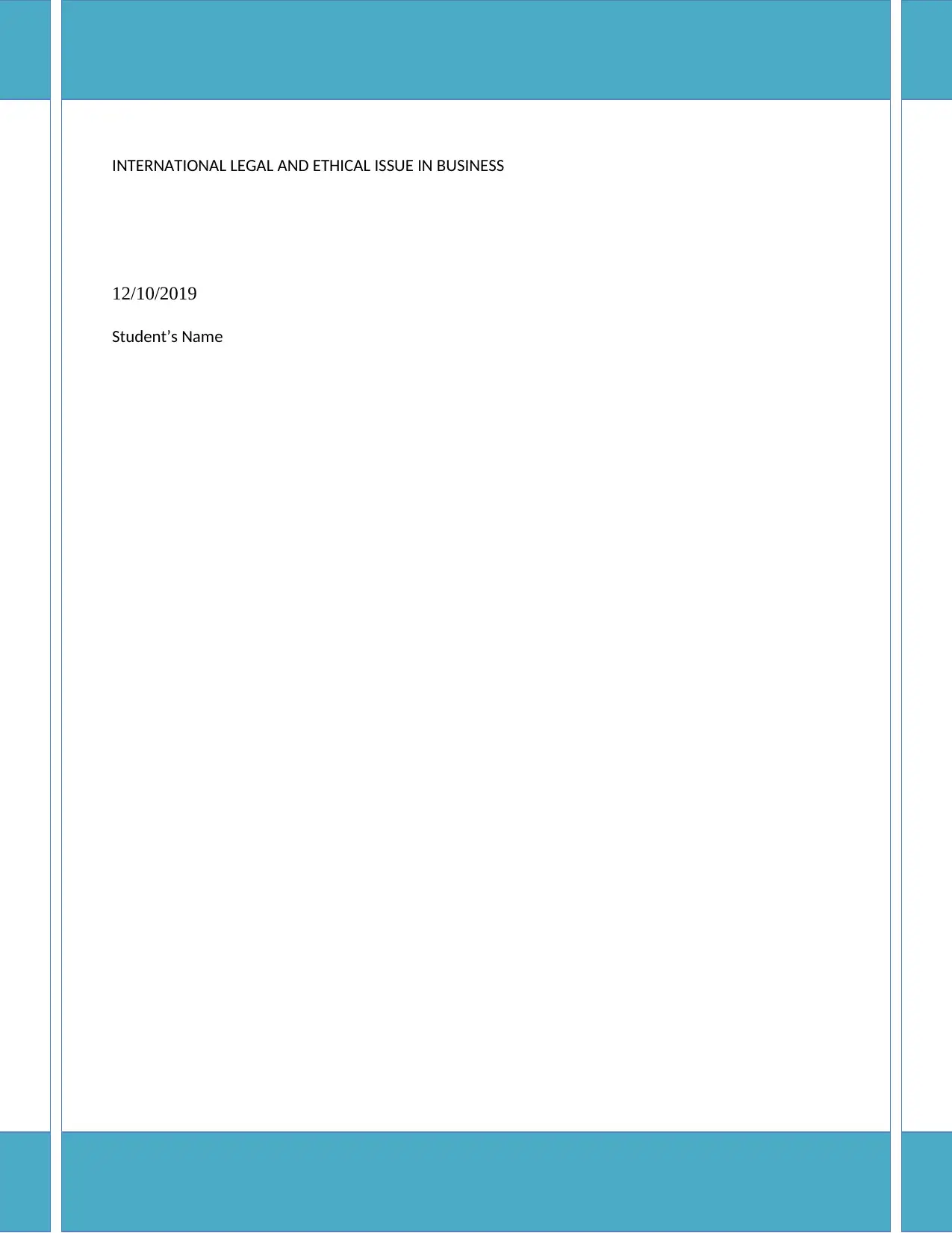
Running Head: BUSINESS AND CORPORATION LAW 0
INTERNATIONAL LEGAL AND ETHICAL ISSUE IN BUSINESS
12/10/2019
Student’s Name
INTERNATIONAL LEGAL AND ETHICAL ISSUE IN BUSINESS
12/10/2019
Student’s Name
Paraphrase This Document
Need a fresh take? Get an instant paraphrase of this document with our AI Paraphraser
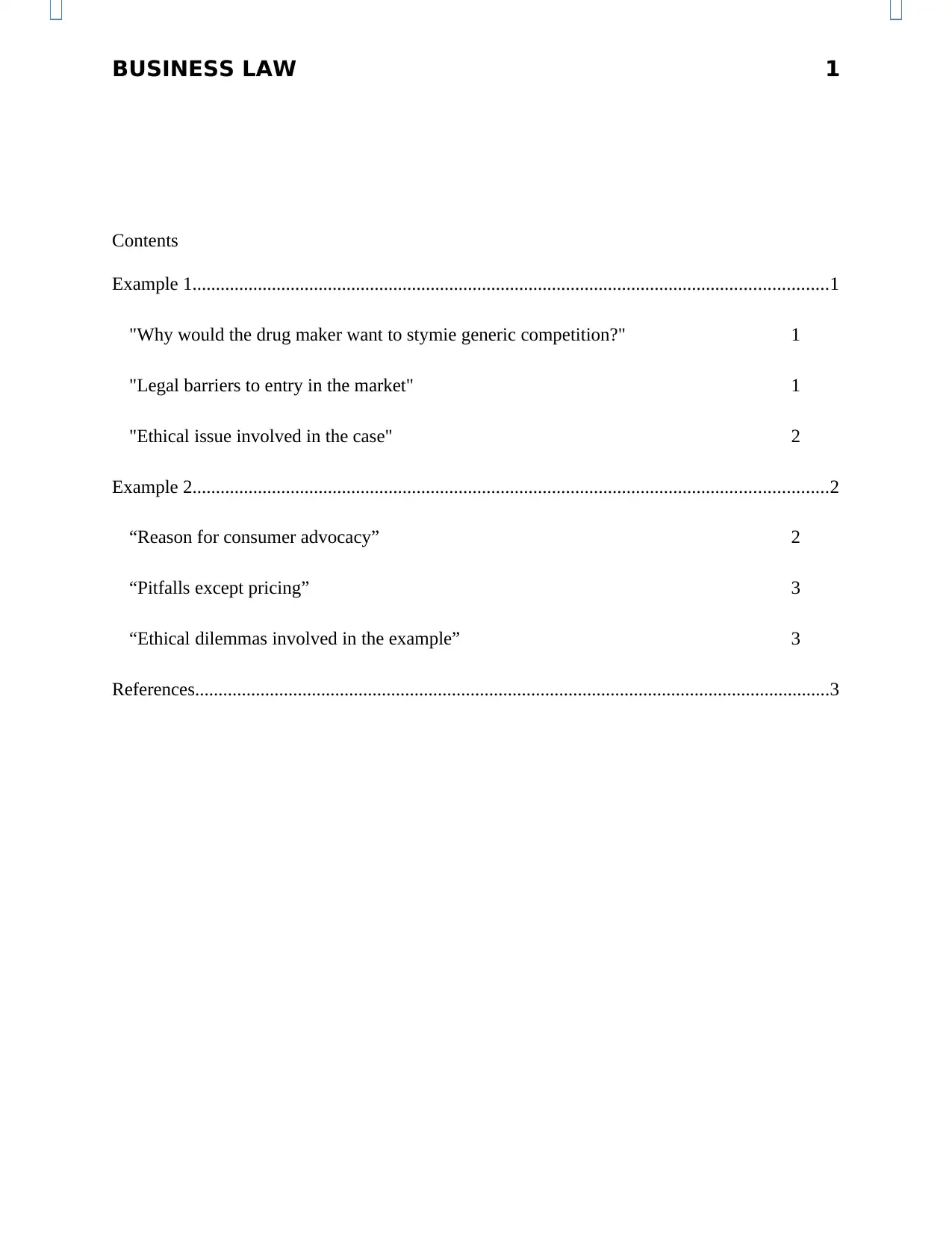
BUSINESS LAW 1
Contents
Example 1........................................................................................................................................1
"Why would the drug maker want to stymie generic competition?" 1
"Legal barriers to entry in the market" 1
"Ethical issue involved in the case" 2
Example 2........................................................................................................................................2
“Reason for consumer advocacy” 2
“Pitfalls except pricing” 3
“Ethical dilemmas involved in the example” 3
References........................................................................................................................................3
Contents
Example 1........................................................................................................................................1
"Why would the drug maker want to stymie generic competition?" 1
"Legal barriers to entry in the market" 1
"Ethical issue involved in the case" 2
Example 2........................................................................................................................................2
“Reason for consumer advocacy” 2
“Pitfalls except pricing” 3
“Ethical dilemmas involved in the example” 3
References........................................................................................................................................3
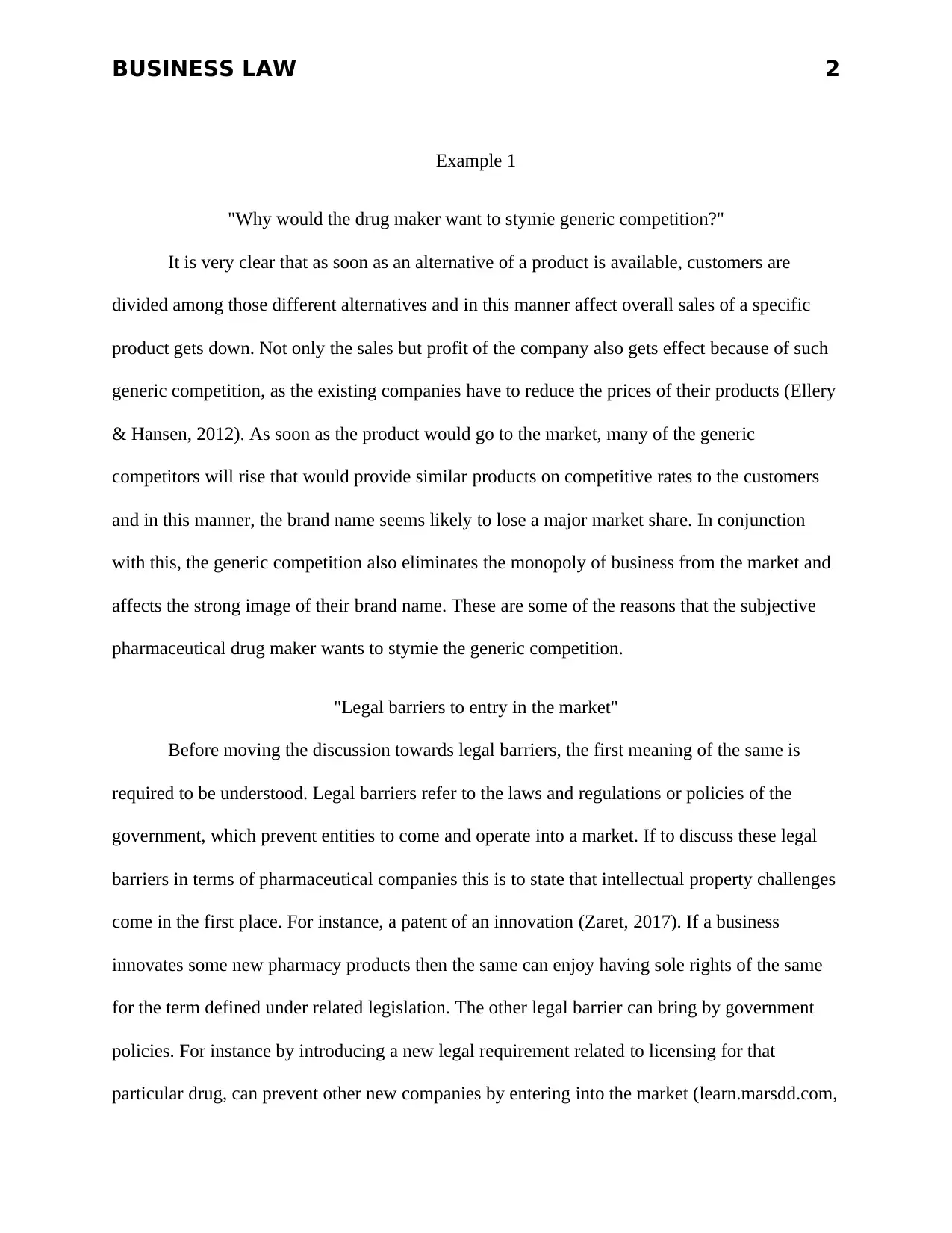
BUSINESS LAW 2
Example 1
"Why would the drug maker want to stymie generic competition?"
It is very clear that as soon as an alternative of a product is available, customers are
divided among those different alternatives and in this manner affect overall sales of a specific
product gets down. Not only the sales but profit of the company also gets effect because of such
generic competition, as the existing companies have to reduce the prices of their products (Ellery
& Hansen, 2012). As soon as the product would go to the market, many of the generic
competitors will rise that would provide similar products on competitive rates to the customers
and in this manner, the brand name seems likely to lose a major market share. In conjunction
with this, the generic competition also eliminates the monopoly of business from the market and
affects the strong image of their brand name. These are some of the reasons that the subjective
pharmaceutical drug maker wants to stymie the generic competition.
"Legal barriers to entry in the market"
Before moving the discussion towards legal barriers, the first meaning of the same is
required to be understood. Legal barriers refer to the laws and regulations or policies of the
government, which prevent entities to come and operate into a market. If to discuss these legal
barriers in terms of pharmaceutical companies this is to state that intellectual property challenges
come in the first place. For instance, a patent of an innovation (Zaret, 2017). If a business
innovates some new pharmacy products then the same can enjoy having sole rights of the same
for the term defined under related legislation. The other legal barrier can bring by government
policies. For instance by introducing a new legal requirement related to licensing for that
particular drug, can prevent other new companies by entering into the market (learn.marsdd.com,
Example 1
"Why would the drug maker want to stymie generic competition?"
It is very clear that as soon as an alternative of a product is available, customers are
divided among those different alternatives and in this manner affect overall sales of a specific
product gets down. Not only the sales but profit of the company also gets effect because of such
generic competition, as the existing companies have to reduce the prices of their products (Ellery
& Hansen, 2012). As soon as the product would go to the market, many of the generic
competitors will rise that would provide similar products on competitive rates to the customers
and in this manner, the brand name seems likely to lose a major market share. In conjunction
with this, the generic competition also eliminates the monopoly of business from the market and
affects the strong image of their brand name. These are some of the reasons that the subjective
pharmaceutical drug maker wants to stymie the generic competition.
"Legal barriers to entry in the market"
Before moving the discussion towards legal barriers, the first meaning of the same is
required to be understood. Legal barriers refer to the laws and regulations or policies of the
government, which prevent entities to come and operate into a market. If to discuss these legal
barriers in terms of pharmaceutical companies this is to state that intellectual property challenges
come in the first place. For instance, a patent of an innovation (Zaret, 2017). If a business
innovates some new pharmacy products then the same can enjoy having sole rights of the same
for the term defined under related legislation. The other legal barrier can bring by government
policies. For instance by introducing a new legal requirement related to licensing for that
particular drug, can prevent other new companies by entering into the market (learn.marsdd.com,
⊘ This is a preview!⊘
Do you want full access?
Subscribe today to unlock all pages.

Trusted by 1+ million students worldwide
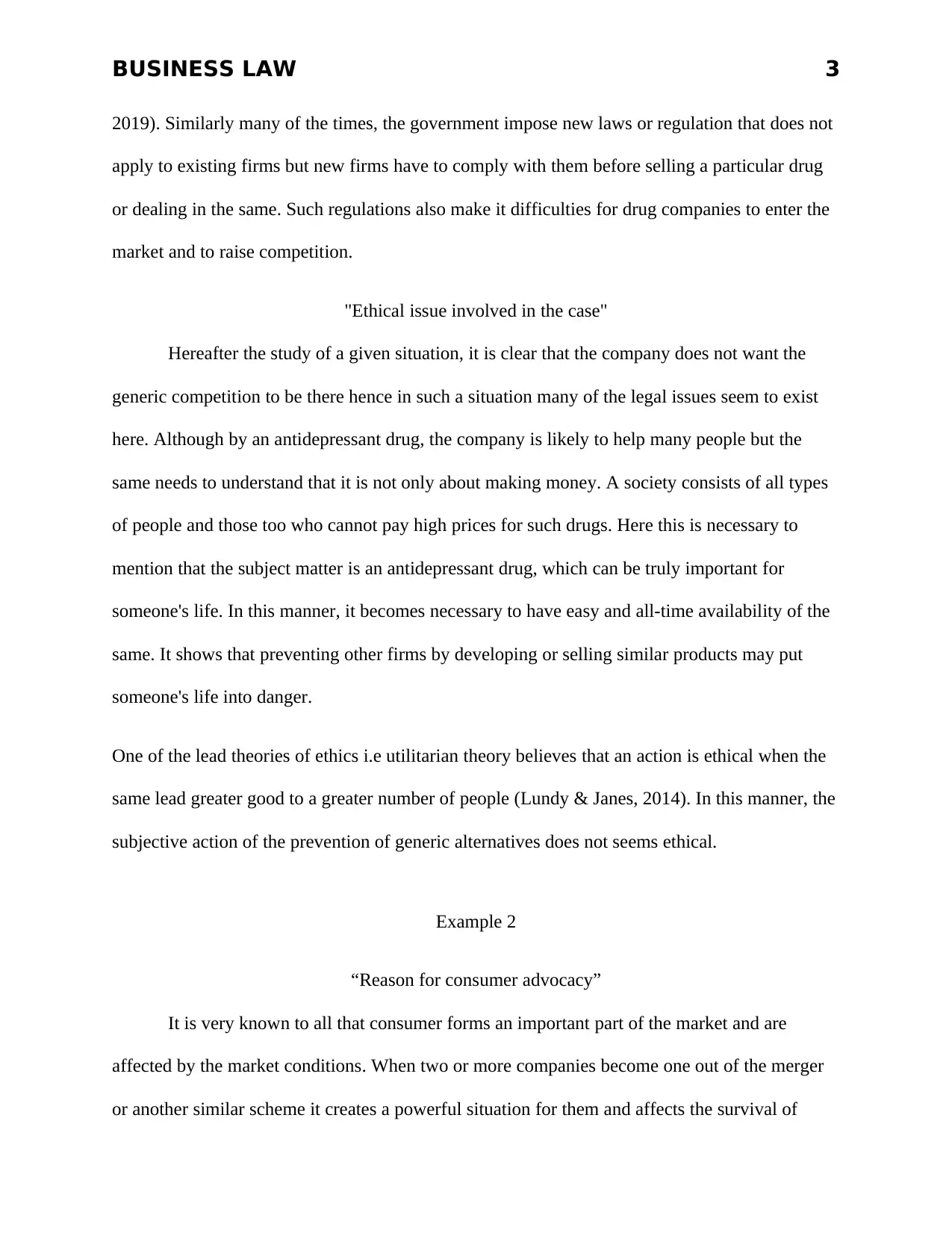
BUSINESS LAW 3
2019). Similarly many of the times, the government impose new laws or regulation that does not
apply to existing firms but new firms have to comply with them before selling a particular drug
or dealing in the same. Such regulations also make it difficulties for drug companies to enter the
market and to raise competition.
"Ethical issue involved in the case"
Hereafter the study of a given situation, it is clear that the company does not want the
generic competition to be there hence in such a situation many of the legal issues seem to exist
here. Although by an antidepressant drug, the company is likely to help many people but the
same needs to understand that it is not only about making money. A society consists of all types
of people and those too who cannot pay high prices for such drugs. Here this is necessary to
mention that the subject matter is an antidepressant drug, which can be truly important for
someone's life. In this manner, it becomes necessary to have easy and all-time availability of the
same. It shows that preventing other firms by developing or selling similar products may put
someone's life into danger.
One of the lead theories of ethics i.e utilitarian theory believes that an action is ethical when the
same lead greater good to a greater number of people (Lundy & Janes, 2014). In this manner, the
subjective action of the prevention of generic alternatives does not seems ethical.
Example 2
“Reason for consumer advocacy”
It is very known to all that consumer forms an important part of the market and are
affected by the market conditions. When two or more companies become one out of the merger
or another similar scheme it creates a powerful situation for them and affects the survival of
2019). Similarly many of the times, the government impose new laws or regulation that does not
apply to existing firms but new firms have to comply with them before selling a particular drug
or dealing in the same. Such regulations also make it difficulties for drug companies to enter the
market and to raise competition.
"Ethical issue involved in the case"
Hereafter the study of a given situation, it is clear that the company does not want the
generic competition to be there hence in such a situation many of the legal issues seem to exist
here. Although by an antidepressant drug, the company is likely to help many people but the
same needs to understand that it is not only about making money. A society consists of all types
of people and those too who cannot pay high prices for such drugs. Here this is necessary to
mention that the subject matter is an antidepressant drug, which can be truly important for
someone's life. In this manner, it becomes necessary to have easy and all-time availability of the
same. It shows that preventing other firms by developing or selling similar products may put
someone's life into danger.
One of the lead theories of ethics i.e utilitarian theory believes that an action is ethical when the
same lead greater good to a greater number of people (Lundy & Janes, 2014). In this manner, the
subjective action of the prevention of generic alternatives does not seems ethical.
Example 2
“Reason for consumer advocacy”
It is very known to all that consumer forms an important part of the market and are
affected by the market conditions. When two or more companies become one out of the merger
or another similar scheme it creates a powerful situation for them and affects the survival of
Paraphrase This Document
Need a fresh take? Get an instant paraphrase of this document with our AI Paraphraser
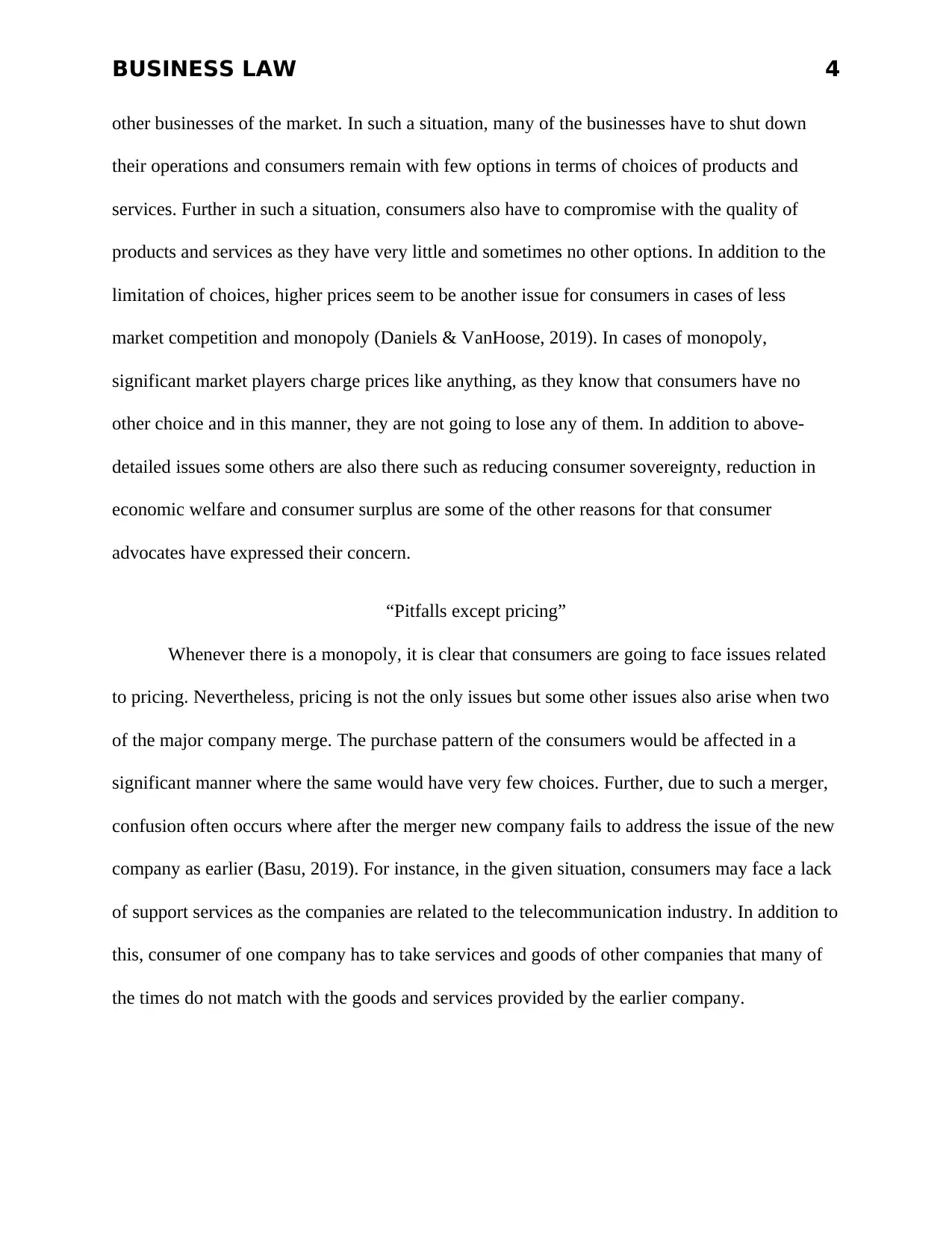
BUSINESS LAW 4
other businesses of the market. In such a situation, many of the businesses have to shut down
their operations and consumers remain with few options in terms of choices of products and
services. Further in such a situation, consumers also have to compromise with the quality of
products and services as they have very little and sometimes no other options. In addition to the
limitation of choices, higher prices seem to be another issue for consumers in cases of less
market competition and monopoly (Daniels & VanHoose, 2019). In cases of monopoly,
significant market players charge prices like anything, as they know that consumers have no
other choice and in this manner, they are not going to lose any of them. In addition to above-
detailed issues some others are also there such as reducing consumer sovereignty, reduction in
economic welfare and consumer surplus are some of the other reasons for that consumer
advocates have expressed their concern.
“Pitfalls except pricing”
Whenever there is a monopoly, it is clear that consumers are going to face issues related
to pricing. Nevertheless, pricing is not the only issues but some other issues also arise when two
of the major company merge. The purchase pattern of the consumers would be affected in a
significant manner where the same would have very few choices. Further, due to such a merger,
confusion often occurs where after the merger new company fails to address the issue of the new
company as earlier (Basu, 2019). For instance, in the given situation, consumers may face a lack
of support services as the companies are related to the telecommunication industry. In addition to
this, consumer of one company has to take services and goods of other companies that many of
the times do not match with the goods and services provided by the earlier company.
other businesses of the market. In such a situation, many of the businesses have to shut down
their operations and consumers remain with few options in terms of choices of products and
services. Further in such a situation, consumers also have to compromise with the quality of
products and services as they have very little and sometimes no other options. In addition to the
limitation of choices, higher prices seem to be another issue for consumers in cases of less
market competition and monopoly (Daniels & VanHoose, 2019). In cases of monopoly,
significant market players charge prices like anything, as they know that consumers have no
other choice and in this manner, they are not going to lose any of them. In addition to above-
detailed issues some others are also there such as reducing consumer sovereignty, reduction in
economic welfare and consumer surplus are some of the other reasons for that consumer
advocates have expressed their concern.
“Pitfalls except pricing”
Whenever there is a monopoly, it is clear that consumers are going to face issues related
to pricing. Nevertheless, pricing is not the only issues but some other issues also arise when two
of the major company merge. The purchase pattern of the consumers would be affected in a
significant manner where the same would have very few choices. Further, due to such a merger,
confusion often occurs where after the merger new company fails to address the issue of the new
company as earlier (Basu, 2019). For instance, in the given situation, consumers may face a lack
of support services as the companies are related to the telecommunication industry. In addition to
this, consumer of one company has to take services and goods of other companies that many of
the times do not match with the goods and services provided by the earlier company.
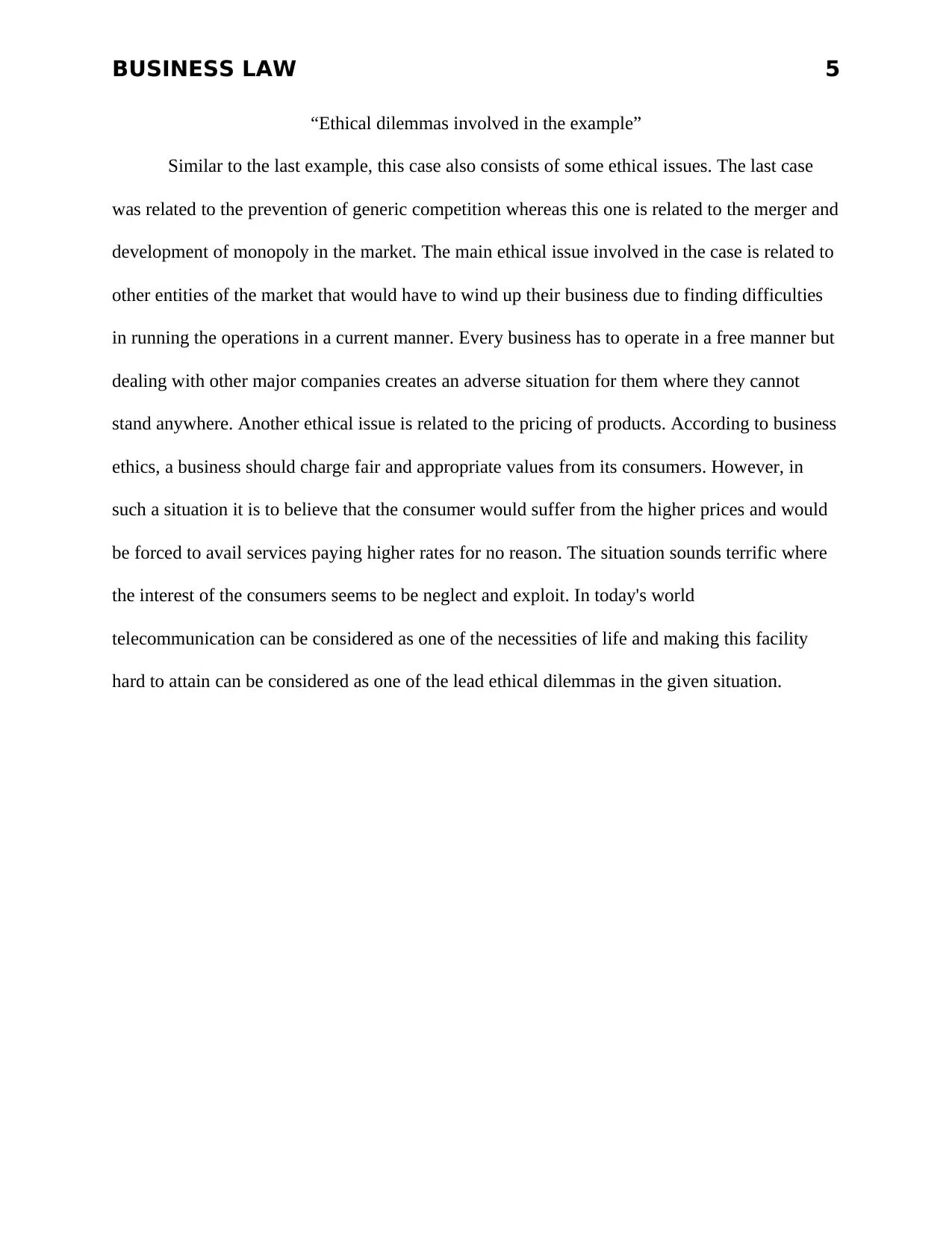
BUSINESS LAW 5
“Ethical dilemmas involved in the example”
Similar to the last example, this case also consists of some ethical issues. The last case
was related to the prevention of generic competition whereas this one is related to the merger and
development of monopoly in the market. The main ethical issue involved in the case is related to
other entities of the market that would have to wind up their business due to finding difficulties
in running the operations in a current manner. Every business has to operate in a free manner but
dealing with other major companies creates an adverse situation for them where they cannot
stand anywhere. Another ethical issue is related to the pricing of products. According to business
ethics, a business should charge fair and appropriate values from its consumers. However, in
such a situation it is to believe that the consumer would suffer from the higher prices and would
be forced to avail services paying higher rates for no reason. The situation sounds terrific where
the interest of the consumers seems to be neglect and exploit. In today's world
telecommunication can be considered as one of the necessities of life and making this facility
hard to attain can be considered as one of the lead ethical dilemmas in the given situation.
“Ethical dilemmas involved in the example”
Similar to the last example, this case also consists of some ethical issues. The last case
was related to the prevention of generic competition whereas this one is related to the merger and
development of monopoly in the market. The main ethical issue involved in the case is related to
other entities of the market that would have to wind up their business due to finding difficulties
in running the operations in a current manner. Every business has to operate in a free manner but
dealing with other major companies creates an adverse situation for them where they cannot
stand anywhere. Another ethical issue is related to the pricing of products. According to business
ethics, a business should charge fair and appropriate values from its consumers. However, in
such a situation it is to believe that the consumer would suffer from the higher prices and would
be forced to avail services paying higher rates for no reason. The situation sounds terrific where
the interest of the consumers seems to be neglect and exploit. In today's world
telecommunication can be considered as one of the necessities of life and making this facility
hard to attain can be considered as one of the lead ethical dilemmas in the given situation.
⊘ This is a preview!⊘
Do you want full access?
Subscribe today to unlock all pages.

Trusted by 1+ million students worldwide
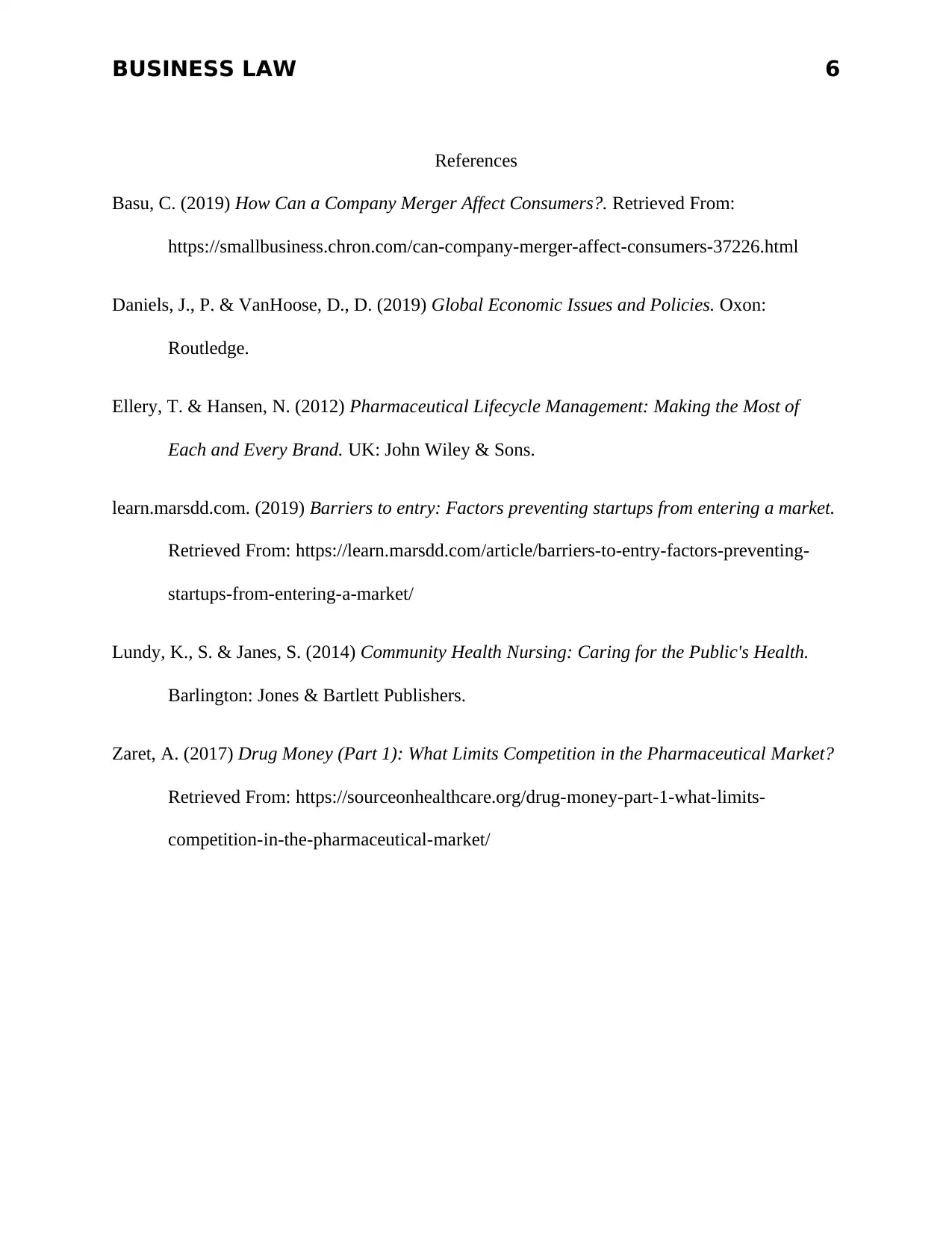
BUSINESS LAW 6
References
Basu, C. (2019) How Can a Company Merger Affect Consumers?. Retrieved From:
https://smallbusiness.chron.com/can-company-merger-affect-consumers-37226.html
Daniels, J., P. & VanHoose, D., D. (2019) Global Economic Issues and Policies. Oxon:
Routledge.
Ellery, T. & Hansen, N. (2012) Pharmaceutical Lifecycle Management: Making the Most of
Each and Every Brand. UK: John Wiley & Sons.
learn.marsdd.com. (2019) Barriers to entry: Factors preventing startups from entering a market.
Retrieved From: https://learn.marsdd.com/article/barriers-to-entry-factors-preventing-
startups-from-entering-a-market/
Lundy, K., S. & Janes, S. (2014) Community Health Nursing: Caring for the Public's Health.
Barlington: Jones & Bartlett Publishers.
Zaret, A. (2017) Drug Money (Part 1): What Limits Competition in the Pharmaceutical Market?
Retrieved From: https://sourceonhealthcare.org/drug-money-part-1-what-limits-
competition-in-the-pharmaceutical-market/
References
Basu, C. (2019) How Can a Company Merger Affect Consumers?. Retrieved From:
https://smallbusiness.chron.com/can-company-merger-affect-consumers-37226.html
Daniels, J., P. & VanHoose, D., D. (2019) Global Economic Issues and Policies. Oxon:
Routledge.
Ellery, T. & Hansen, N. (2012) Pharmaceutical Lifecycle Management: Making the Most of
Each and Every Brand. UK: John Wiley & Sons.
learn.marsdd.com. (2019) Barriers to entry: Factors preventing startups from entering a market.
Retrieved From: https://learn.marsdd.com/article/barriers-to-entry-factors-preventing-
startups-from-entering-a-market/
Lundy, K., S. & Janes, S. (2014) Community Health Nursing: Caring for the Public's Health.
Barlington: Jones & Bartlett Publishers.
Zaret, A. (2017) Drug Money (Part 1): What Limits Competition in the Pharmaceutical Market?
Retrieved From: https://sourceonhealthcare.org/drug-money-part-1-what-limits-
competition-in-the-pharmaceutical-market/
1 out of 7
Related Documents
Your All-in-One AI-Powered Toolkit for Academic Success.
+13062052269
info@desklib.com
Available 24*7 on WhatsApp / Email
![[object Object]](/_next/static/media/star-bottom.7253800d.svg)
Unlock your academic potential
Copyright © 2020–2026 A2Z Services. All Rights Reserved. Developed and managed by ZUCOL.





